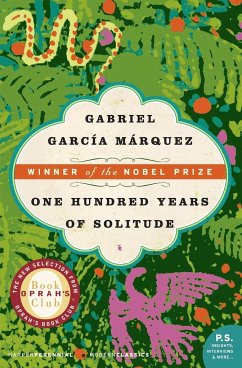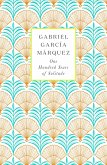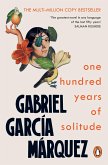"One Hundred Years of Solitude is the first piece of literature since the Book of Genesis that should be required reading for the entire human race. . . . Mr. Garcia Marquez has done nothing less than to create in the reader a sense of all that is profound, meaningful, and meaningless in life." --William Kennedy, New York Times Book Review One of the most influential literary works of our time, One Hundred Years of Solitude remains a dazzling and original achievement by the masterful Gabriel Garcia Marquez, winner of the Nobel Prize in Literature. One Hundred Years of Solitude tells the story of the rise and fall, birth and death of the mythical town of Macondo through the history of the Buendiá family. Inventive, amusing, magnetic, sad and alive with unforgettable men and women--brimming with truth, compassion, and a lyrical magic that strikes the soul--this novel is a masterpiece in the art of fiction.
The book that sort of saved my life Emma Thompson
"You emerge from this marvelous novel as if from a dream, the mind on fire. . . . With a single bound, Gabriel García Márquez leaps onto the stage with Günter Grass and Vladimir Nabokov, his appetite as enormous as his imagination, his fatalism greater than either. Dazzling." - John Leonard, New York Times
"One Hundred Years of Solitude is the first piece of literature since the Book of Genesis that should be required reading for the entire human race. It takes up not long after Genesis left off and carries through to the air age, reporting on everything that happened in between with more lucidity, wit, wisdom, and poetry that is expected from 100 years of novelists, let alone one man. . . . García Márquez has done nothing less than to create in the reader a sense of all that is profound, meaningful, and meaningless in life." - William Kennedy, National Observer
"This extraordinary novel obliterates the family tree in a prose jungle of overwhelming magnificence. . . . You have the sense of living along with the Buendías (and the rest), in them, through them, and in spite of them, in all their loves, madnesses and wars, their allegiances, compromises, dreams and deaths. . . . Like the jungle itself, this novel comes back again and again, fecund, savage and irresistible." - Paul West, Washington Post
"At 50 years old, García Márquez's masterpiece is as important as ever. . . To experience a towering work like One Hundred Years of Solitude is to be reminded of the humility we should all feel when trying to assert what is true and what is false." - LitHub
"One of the seminal works of 20th century Latin American fiction, it is a classic." - Variety
"An irresistible work of storytelling, mixing the magic of the fairy tale, the realistic detail of the domestic novel and the breadth of the family saga." - New York Times
"The greatest novel in any language of the last fifty years." - Salman Rushdie
"Unofficially, it's everybody's favorite work of world literature and the novel that, more than any other since World War II, has inspired novelists of our time-from Toni Morrison to Salman Rushdie to Junot Díaz. . . . Sexy, entertaining, experimental, politically radical, and wildly popular all at once." - Vanity Fair
"No other writer in our time has operated on so vast a scale. None has approached his literary achievement. . . . [García Márquez is] the most important writer of the second half of the twentieth century in any language." - The Nation
"One Hundred Years of Solitude is substantive and substantial, and its prose precise for the simple reason that its sentences are too exquisite to be inessential. It is a novel on which is bestowed the laurels usually awarded to great works of frugal prose. Yet its genius is in the operatic telling." - USA Weekend
"The greatest revelation in the Spanish language since Don Quixote." - Pablo Neruda
"One Hundred Years of Solitude offers plenty of reflections on loneliness and the passing of time. It can also be seen as a caustic commentary on the evils of war, or a warm appreciation of familial bonds. García Márquez has urgent things to say that still feel close to home, 50 years after the book was first published." - USA Today (four stars)
"A fabulous creation of magic, and metaphor, and myth. . . . To depict a world so fabulous, so exotic, so extravagant in its comic and tragic effects and yet so palpably real is a magnificent achievement." - William McPherson, Washington Post
One of the Landmarks of Modern Literature - New York Public Library
"[This novel] is very special. . . . An expansive legend of a town and family, a political parable, an instrument of rare magic that performs astonishing miracles of transformation. It is a comic masterpiece. It is intelligent. It is slippery with the juice of life." - Newsweek
"One Hundred Years of Solitude is the first piece of literature since the Book of Genesis that should be required reading for the entire human race. It takes up not long after Genesis left off and carries through to the air age, reporting on everything that happened in between with more lucidity, wit, wisdom, and poetry that is expected from 100 years of novelists, let alone one man. . . . García Márquez has done nothing less than to create in the reader a sense of all that is profound, meaningful, and meaningless in life." - William Kennedy, National Observer
"This extraordinary novel obliterates the family tree in a prose jungle of overwhelming magnificence. . . . You have the sense of living along with the Buendías (and the rest), in them, through them, and in spite of them, in all their loves, madnesses and wars, their allegiances, compromises, dreams and deaths. . . . Like the jungle itself, this novel comes back again and again, fecund, savage and irresistible." - Paul West, Washington Post
"At 50 years old, García Márquez's masterpiece is as important as ever. . . To experience a towering work like One Hundred Years of Solitude is to be reminded of the humility we should all feel when trying to assert what is true and what is false." - LitHub
"One of the seminal works of 20th century Latin American fiction, it is a classic." - Variety
"An irresistible work of storytelling, mixing the magic of the fairy tale, the realistic detail of the domestic novel and the breadth of the family saga." - New York Times
"The greatest novel in any language of the last fifty years." - Salman Rushdie
"Unofficially, it's everybody's favorite work of world literature and the novel that, more than any other since World War II, has inspired novelists of our time-from Toni Morrison to Salman Rushdie to Junot Díaz. . . . Sexy, entertaining, experimental, politically radical, and wildly popular all at once." - Vanity Fair
"No other writer in our time has operated on so vast a scale. None has approached his literary achievement. . . . [García Márquez is] the most important writer of the second half of the twentieth century in any language." - The Nation
"One Hundred Years of Solitude is substantive and substantial, and its prose precise for the simple reason that its sentences are too exquisite to be inessential. It is a novel on which is bestowed the laurels usually awarded to great works of frugal prose. Yet its genius is in the operatic telling." - USA Weekend
"The greatest revelation in the Spanish language since Don Quixote." - Pablo Neruda
"One Hundred Years of Solitude offers plenty of reflections on loneliness and the passing of time. It can also be seen as a caustic commentary on the evils of war, or a warm appreciation of familial bonds. García Márquez has urgent things to say that still feel close to home, 50 years after the book was first published." - USA Today (four stars)
"A fabulous creation of magic, and metaphor, and myth. . . . To depict a world so fabulous, so exotic, so extravagant in its comic and tragic effects and yet so palpably real is a magnificent achievement." - William McPherson, Washington Post
One of the Landmarks of Modern Literature - New York Public Library
"[This novel] is very special. . . . An expansive legend of a town and family, a political parable, an instrument of rare magic that performs astonishing miracles of transformation. It is a comic masterpiece. It is intelligent. It is slippery with the juice of life." - Newsweek








